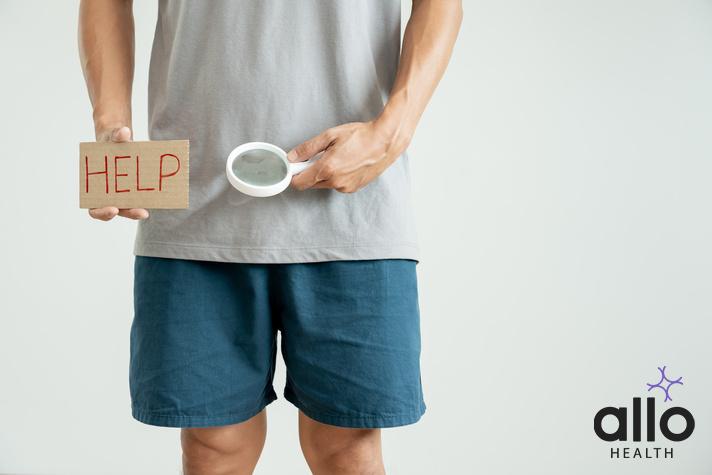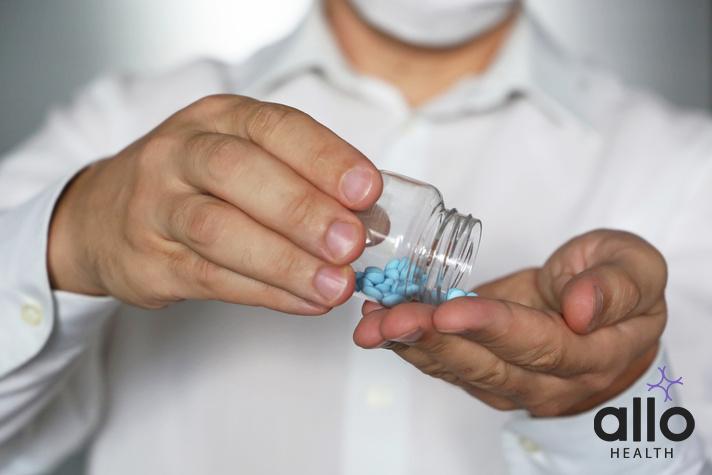Causes of Erectile Dysfunction in 30s

Allo Health is dedicated to personalized well-being, offering support and trusted information tailored to individual health goals. The platform emphasizes human-generated content, led by a distinguished medical team of experts, including physicians and sexual health specialists. Their commitment to credibility involves rigorous fact-checking, authoritative research, and continuous updates to ensure accurate, up-to-date information. Allo Health's unique approach goes beyond conventional platforms, providing expert-led insights and a continuous commitment to excellence, with user feedback playing a crucial role in shaping the platform's authoritative voice.

Dr. Aditi completed her undergraduate medical education at AJIMS, Mangalore, after which she worked in multi-speciality hospitals with COVID patients and in the Pain and Palliative medicine department. Driven by her experiences, she developed a keen interest in psychiatry. Dr. Aditi believes that mental health is just as, if not more important, than physical health.
Why This Was Upated?
Our experts continually monitor the health and wellness space, and we update our articles when new information became available.
Updated on 25 January, 2024
- Article was updated as part of our commitment to diversity, equity, and inclusion.

"The following blog article provides general information and insights on various topics. However, it is important to note that the information presented is not intended as professional advice in any specific field or area. The content of this blog is for general educational and informational purposes only.
Book consultation
The content should not be interpreted as endorsement, recommendation, or guarantee of any product, service, or information mentioned. Readers are solely responsible for the decisions and actions they take based on the information provided in this blog. It is essential to exercise individual judgment, critical thinking, and personal responsibility when applying or implementing any information or suggestions discussed in the blog."
Erectile dysfunction (ED) is a common health concern, particularly for men in their 30s. Understanding the causes of erectile dysfunction in 30s is crucial for maintaining a healthy sex life and overall well-being. If you have erectile dysfunction in your 30s, don’t worry. You’re not the only person going through it, and many treatments are available to help you overcome ED. Let’s get into it.
What is Erectile Dysfunction?
Erectile dysfunction (ED) is a common sexual health concern characterized by the inability to achieve or maintain an erection adequate for satisfactory sexual activity. It’s a type of sexual dysfunction that can significantly impact a man’s sex life and overall well-being.
Symptoms of Erectile Dysfunction
The primary symptom of erectile dysfunction is the consistent difficulty in achieving or maintaining an erection. However, it can be associated with several other symptoms:
- Reduced Sexual Desire: A decrease in sex drive is often linked with ED.
- Trouble Getting an Erection: Difficulty in achieving an erection during sexual arousal.
- Difficulty Maintaining an Erection: Inability to keep an erection firm enough for the duration of sexual activity.
- Weak Erections: Erections that are not firm enough for penetration.
- Performance Anxiety: Stress and anxiety about sexual performance can exacerbate ED.
ED can be a warning sign of underlying health conditions, such as cardiovascular disease, diabetes, and high blood pressure, which can affect blood flow and blood vessel health. It’s also linked with mental health concerns like stress and depression, which can impact sexual function.
Individuals experiencing symptoms of erectile dysfunction, especially if it becomes a recurring concern, are advised to seek medical advice. A healthcare provider can offer guidance on erectile dysfunction treatments, which may include lifestyle changes, erectile dysfunction medications, or the use of devices like vacuum erection devices. Addressing ED is not only important for maintaining a healthy sex life but also for overall health, as it can be indicative of other health concerns.
Is Erectile Dysfunction Common for Men in 30s?
Yes, it is relatively common for men to experience erectile dysfunction (ED) in their 30s, though the prevalence is lower than in older age groups.
While it’s not as prevalent as in older men, ED in the 30s is not rare and is increasingly being recognized and addressed by healthcare providers. It’s important for those experiencing symptoms to seek medical advice, as ED can sometimes be a sign of underlying health conditions and can often be effectively treated.
Common Causes of Erectile Dysfunction in 30s
Erectile dysfunction in men in their 30s can be caused by a variety of factors, including both physical and psychological concerns.
- Blood Flow Concerns: Poor blood circulation, often due to cardiovascular problems or the hardening of arteries (including the penile arteries), can significantly impact erectile function.
- Heart Disease and Cardiovascular Events: Conditions like heart disease can impair blood flow, a critical factor for maintaining an erection. This is a major health concern and a common factor for erectile dysfunction.
- Blood Pressure and Blood Vessel Diseases: High blood pressure and diseases affecting blood vessels can lead to weakened erections. Blood pressure medications can also sometimes contribute to erectile dysfunction.
- Lifestyle Factors
- Heavy Alcohol Consumption, Illegal Drugs, and Recreational Drugs: These substances can negatively affect sexual health and sexual function.
- Sedentary Lifestyle: A lack of physical activity is a primary risk factor for ED.
- Smoking: This habit is harmful to blood circulation and can lead to erectile dysfunction.
- Psychological Factors
- Performance Anxiety and Stress: These can create a vicious cycle affecting sexual arousal and sexual performance.
- Mental Health Concerns: Conditions like depression can lower sex drive and impact sexual function.
-
Underlying Health Conditions
- Diabetes and obesity are key risk factors that can cause erectile dysfunction by affecting blood vessels, blood flow, and hormonal function.
- Cardiovascular disease can also be a significant contributor.
- Medical Condition and Medications: Certain health conditions and the use of various medications, especially blood pressure medicines, can lead to ED as a side effect.
- Sexual Dysfunctions: Other types of sexual dysfunctions can also contribute to or coexist with erectile dysfunction, affecting overall sexual health.
- Hormonal Imbalances: Problems with hormonal function can impact erectile function.
Understanding these causes is vital for men in their 30s experiencing erectile dysfunction. It’s recommended to seek medical advice from a healthcare provider to address these concerns effectively, as they can offer guidance on erectile dysfunction treatments, lifestyle changes, and management of any underlying health conditions.
Treatment for Erectile Dysfunction in 30s

Treating erectile dysfunction (ED) at 30 involves a multifaceted approach, addressing both physical and psychological factors to restore sexual health and function.
Understand Erectile Dysfunction
First, recognize that ED is a common health condition affecting blood flow and sexual function. It’s important not to view it as just a sexual health concern but as a potential sign of underlying health conditions.
Lifestyle Modifications
- Exercise: Regular aerobic activity improves cardiovascular health, enhancing blood circulation and erectile function.
- Diet: A balanced diet supports healthy blood flow and hormonal function.
- Reduce Alcohol and Quit Smoking: Heavy alcohol consumption, smoking, and recreational drugs can impair sexual and erectile function.
- Manage Weight: A sedentary lifestyle is a primary risk factor for ED; maintaining a healthy weight is crucial.
Medical Approaches
- Erectile Dysfunction Medications: These are often the first-line treatment for improving erectile function.
- Blood Pressure Medicines: If you’re on medication, consult your healthcare provider, as some can contribute to ED.
- Vacuum Erection Devices: These can help in achieving and maintaining erections.
- Penile Prosthesis: In severe cases of erectile dysfunction, surgical options may be considered.
Address Psychological Factors
- Counseling for Performance Anxiety: Sexual performance anxiety can be a significant factor for erectile dysfunction. Professional counseling can help.
- Focus on Mental Health: Conditions like stress and depression can impact your sex life. Seek appropriate mental health care.
Regular Health Screening
- Consult a Healthcare Provider: It’s essential to rule out cardiovascular events, heart disease, and other medical conditions that might be contributing to ED.
- Monitor Blood Pressure: High blood pressure can lead to blood vessel diseases, affecting erectile function.
Understand the Broader Implications
Remember, erectile dysfunction at this age can be a warning sign of more severe health concerns like heart attack risk or cardiovascular disease. It’s not just about sexual activity or sex drive but a significant health concern.
Preventive Measures

Preventing erectile dysfunction at the age of 30 involves a combination of maintaining good physical health, psychological well-being, and making informed lifestyle choices.
Maintain Healthy Blood Flow and Cardiovascular Health
- Do Regular Aerobic Activity: Exercise improves blood circulation, a crucial factor for erectile function.
- Heart Disease Prevention: Regular health checks to monitor for cardiovascular events and conditions.
- Control Blood Pressure: High blood pressure can damage blood vessels, so maintaining a healthy blood pressure is essential.
Lifestyle Modifications
- Reduce Heavy Alcohol Consumption: Limiting alcohol intake can improve sexual health.
- Avoid Recreational Drugs and Illegal Drugs: These substances can negatively impact sexual function.
- Quit Smoking: Smoking is a primary risk factor for ED as it affects blood circulation and hardening of arteries.
- Healthy Diet: A balanced diet supports heart health and overall well-being.
Psychological Health
- Manage Stress and Performance Anxiety: These can create a vicious cycle affecting sexual performance.
- Mental Health Support: Seeking help for mental health concerns can positively impact erectile function.
Regular Medical Consultation
- Consult a Healthcare Provider: Regular check-ups can help identify and manage any underlying health conditions.
- Discuss Erectile Dysfunction Treatments and Medications: Being open about sexual dysfunctions can lead to early management.
Monitoring Medications
- Review Blood Pressure Medications: Some can contribute to ED. Discuss alternatives with your healthcare provider.
- Be aware of medications for other health concerns that might impact sexual function.
Healthy Sexual Habits
- Maintain An Active and Healthy Sex Life: Regular sexual activity can help maintain good sexual function.
- Open Communication with A Partner: Helps in managing performance anxiety and improves sexual arousal.
Understand Risks
- Be aware of the prevalence of erectile dysfunction and its types.
- Recognize ED as a potential warning sign of other health concerns, like heart attack or cardiovascular disease.
Incorporating these measures can significantly reduce the risk of developing erectile dysfunction at 30. However, it’s crucial to consult with a qualified health provider for personalized healthcare advice.
Conclusion
Erectile dysfunction in your 30s can be a warning sign of other health concerns. It’s important to address both physical and psychological factors. Consult a qualified health provider for healthcare advice tailored to your needs. Remember, a combination of lifestyle changes and medical treatment can often lead to a healthy sex life.
Most Asked Questions
-
What causes erectile dysfunction in men in their 30s?
Erectile dysfunction in your 30s can be caused by several factors, including heart disease, high blood pressure, obesity, diabetes, heavy alcohol use, smoking, and certain medications. Psychological factors like stress, anxiety, and depression can also play a significant role.
-
Can lifestyle changes improve erectile function?
Yes, making lifestyle changes can significantly improve erectile function. Regular exercise, a balanced diet, reducing alcohol consumption, and quitting smoking all contribute to better sexual health. These changes not only improve blood flow but also benefit your overall health.
-
Should I see a doctor if I have ED in my 30s?
Yes. It’s important to consult a healthcare provider if you’re experiencing erectile dysfunction. ED can be a warning sign of other health concerns like heart disease or diabetes. Your doctor can provide medical advice and treatment options suited to your condition.
-
Are there treatments available for erectile dysfunction in your 30s?
Yes, there are various treatments for erectile dysfunction. These include medications, vacuum erection devices, and in severe cases, surgical options like penile prosthesis. Additionally, counseling can help if psychological factors are contributing to ED. Your healthcare provider can recommend the best treatment based on your specific needs.






































